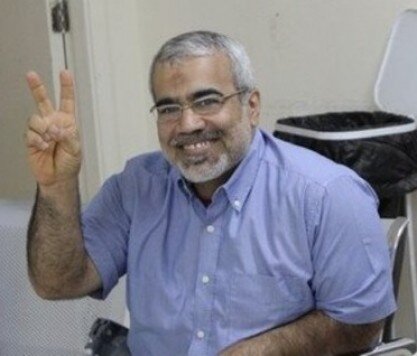Leading prisoner of conscience facing slow death in Bahrain

This week marks the 6th month of Bahraini prisoner of conscience Dr. Abduljalil al-Singace’s hunger-striking in protest of the treatment of the political prisoners at the notorious Central Jau Prison, where he is serving a life sentence over his peaceful role in Bahrain's 2011 pro-democracy uprising. Meanwhile, there is serious concern over his life; so what is Bahrain government waiting for to immediately release him?
Dr. al-Singace is a prisoner of conscience, who has suffered arbitrary detention and severe torture on multiple times before his final arbitrary trial in June 2011, when a military court sentenced him to life imprisonment alongside other prominent protest leaders aka the ‘Bahrain 13’. He rejected being labelled a criminal, as the government convicted him on grounds relating to his peaceful exercise of his freedoms of speech and assembly.
Dr. al-Singace then waited 4 years to receive treatment for a nose injury he suffered due to the inhumane torture, documented in the BICI famous report. He also suffered damage to his ear but has not received adequate medical attention.
Dr. al-Singace is a 2007 Draper Hills Fellow at Stanford University’s Center on Democracy Development, and the Rule of Law. He is also a former Professor of Engineering at the University of Bahrain, an academic and a blogger, who had long campaigned for an end to human rights violations in Bahrain on his blog, Al-Faseela, which Bahrain's Internet Service Providers continue to ban access to.
Dr. al Singace’s current hunger-striking began in July 8th, in response to arbitrarily confiscating his academic research, on which he worked for 4 consecutive years.
He is also not receiving the expected medical care as he is suffering from severe intermittent headaches, a prostate problem, arthritis in his shoulder joint, tremors, diminished eyesight, and low immunity due to a low white blood cell count.
Since November 2021, he has lost 20 kilograms in weight. Dr. Al-Singace has escalated his hunger strike by refusing to take IVs, supplementary vitamins and oral medication in protest at Bahrain prison authorities punitively suspending his video calls. He survives on nutritional drinks, oral rehydration salts, glucose, water, and an IV drip. He waited more than two months to receive a CT scan as requested by his specialist, and he is not receiving daily medical check-ups except in rare emergency situations. Besides, his frequent requests for painkillers and a hot water bottle to relieve his pain were refused.
This is not Dr. Al-Singace's first hunger-striking. In March 2015, he protested against the violent response of the Bahrain Ministry of Interior to a riot that took place in Jaw Prison. Though only a minority of inmates participated in the riot, police collectively punished all detainees, subjecting them to beatings and other humiliating and degrading acts; depriving them of sleep and food; and denying them access to sanitation facilities.
For over 6 months, Dr. Al-Singace subsisted on water, fluids, and IV injections for sustenance. According to his family, Dr. al-Singace was not transferred to the hospital for he refused to wear a prisoner’s uniform on the grounds that he is a prisoner of conscience and not a criminal.
Since then, the prison authorities lifted a ban on Dr al-Singace receiving writing and reading materials and denied him permission to receive magazines sent to him in an English PEN-led campaign. He has no access to television, radio, or print media too.
Amid the blatant silence of the United States, the United Kingdom, and the European Union member states, the United States and the United, various rights groups and activists have demanded Dr. Abduljalil al-Singace’s urgent and unconditional release and the release of all political prisoners detained in Bahrain. Yet the Manama regime continues to turn deaf ears to these calls, and apparently slowly killing Dr. Abduljalil Al-Singace.
Leave a Comment